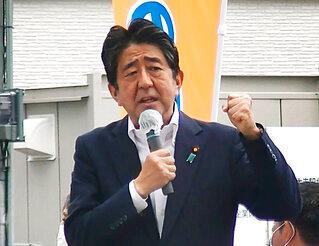Former Japanese Prime Minister Shinzo Abe, a divisive conservative and one of his nation's most powerful and influential figures, has died after being shot during a campaign speech Friday in western Japan, hospital officials said.
Abe, 67, was shot from behind minutes after he started his speech in Nara. He was airlifted to a hospital for emergency treatment but was not breathing and his heart had stopped. He was later pronounced dead despite emergency treatment that included massive blood transfusions, hospital officials said.
Police arrested the suspected gunman at the scene of the attack which shocked many in Japan, which is one of the world’s safest nations and has some of the strictest gun control laws anywhere.
Japan, with a population of 125 million, had just 10 gun-related criminal cases last year, resulting in one death and four injuries, according to police. Eight of those cases were gang-related. Tokyo had zero gun incidents, injuries or deaths during that same year, although 61 guns were seized there.
Although major universities in Japan have riflery clubs and Japanese police are armed, most Japanese go through life without ever handling, or even seeing, a real gun.
Stabbings are more common as a fatal crime. And so the debate over the right to bear arms is a distant issue in Japan and has been for decades.
“Japanese people are in a state of shock,” said Shiro Kawamoto, professor at the College of Risk Management at Nihon University in Tokyo.
Adding to the complexity were reports that the weapon used in the shooting may have been homemade, meaning that existing gun controls could be ineffectual.
Prime Minister Fumio Kishida and his Cabinet ministers hastily returned to Tokyo from campaign events around the country after the shooting, which he called “dastardly and barbaric."
Nara Medical University emergency department chief Hidetada Fukushima said Abe suffered major damage to his heart in addition to two neck wounds that damaged an artery, causing extensive bleeding. He was in a state of cardio and pulmonary arrest when he arrived at the hospital and never regained his vital signs, Fukushima said.
Abe was Japan’s longest-serving leader before stepping down in 2020.
Public television NHK aired a dramatic video of Abe giving a speech outside a train station in the western city of Nara. He is standing, dressed in a navy-blue suit, raising his fist, when two gunshots are heard. The video then shows Abe collapsed on the street, with security guards running toward him. He holds his chest, his shirt smeared with blood.
In the next moment, security guards leap on top of a man in a gray shirt who lies face down on the pavement. A double-barreled device that appeared to be a handmade gun is seen on the ground.
Nara prefectural police confirmed the arrest of Tetsuya Yamagami, 41, on suspicion of attempted murder. NHK reported that the suspect served in the Maritime Self-Defense Force for three years in the 2000s.
Other videos from the scene showed campaign officials surrounding Abe. The former leader was still highly influential in the governing Liberal Democratic Party and headed its largest faction, Seiwakai. Elections for Japan's upper house, the less powerful chamber of its parliament, are Sunday.
“I use the harshest words to condemn (the act),” Kishida said as he struggled to control his emotions. He said the government planned to review the security situation but added that Abe had the highest protection.
Opposition leaders condemned the attack as a challenge to Japan’s democracy. In Tokyo, people stopped on the street to grab extra editions of newspapers or watch TV coverage of the shooting.
Loyalists said that his legacy was a stronger U.S.-Japan relationship that was meant to bolster Japan’s defense capability. But Abe made enemies by forcing his defense goals and other contentious issues through parliament, despite strong public opposition.
Abe was a political blue blood who was groomed to follow in the footsteps of his grandfather, former Prime Minister Nobusuke Kishi. His political rhetoric often focused on making Japan a “normal” and “beautiful” nation with a stronger military and a bigger role in international affairs.
Many foreign officials expressed shock over the shooting.
Abe said he was proud of working while he was prime minister for a stronger Japan-U.S. security alliance and shepherding the first visit by a serving U.S. president to the atom-bombed city of Hiroshima.
Abe became Japan’s youngest prime minister in 2006, at age 52, but his first stint abruptly ended a year later, also because of his health.
He won six national elections and built a rock-solid grip on power, bolstering Japan’s defense role and capability and its security alliance with the U.S. He also stepped up patriotic education at schools and raised Japan’s international profile.
Story by Mari Yamaguchi, Chisato Tanaka and Foster Klug, Associated Press.










